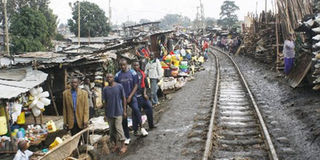Slum residents given houses, shops to give up railway land

The Kenya Railways is planning to develop a proposed rail commuter services within and around Nairobi however Kibera residents have dangerously encroached on the railway.
What you need to know:
- The first phase of the project that includes Syokimau, Imara Daima, Makadara stations and Jomo Kenyatta International Airport link ends this year. Syokimau Station is complete and is already a hit with commuters who opt to leave their cars at home and take the train instead.
A total of 16,000 families living on the railway reserve are being relocated to pave the way for the Nairobi Commuter Rail project to decongest the city’s transport system.
The families, mostly from Kibera and Mukuru slums, have been contacted and will be moving to new houses whose construction is being funded by the World Bank at a cost of Sh3.4 billion.
Kenya Railways Corporation managing director Nduva Muli said they met with a lot of resistance but an agreement was reached last month.
“Moving people from a place they have called home is normally hard even if they are squatters but we are glad we struck a mutual agreement with these families after protracted talks,” he said.
Each family will be given a house and a shop. And to ensure residents protect the railway line and KR property, the design of the houses is such that one wall is part of the parameter fence cordoning off the rail line.
This arrangement means that destroying the fence would mean demolishing one’s house thus making the tenants custodians of KR property.
The first phase of the project that includes Syokimau, Imara Daima, Makadara stations and Jomo Kenyatta International Airport link ends this year. Syokimau Station is complete and is already a hit with commuters who opt to leave their cars at home and take the train instead.
According to a master plan jointly drawn by KR, the World Bank and other partners like InfraCo Limited, 65 stations are earmarked for Nairobi and its environs. Modern diesel trains will ply these routes, a departure from the ancient engines that have been in use for a long time.
The KR boss said it would have been their wish to go fully electric but erratic power supply has slowed progress.
“Areas like ticketing are automated, but if we had a sufficient and reliable power supply, we would be talking in terms of bullet trains and subways that are a common phenomenon in the developed world.”
Mr Muli said the project requires Sh212 billion to complete. It will be rolled out in three phases and include the construction of new lines in areas considered “missing links” such as Westlands, Kiambu and Ruai.
However, some matatu owners and operators are afraid the project might edge them out of business. Mr Anthony Gitonga is one such owner who said KR should leave city transport to public service vehicles.
“We will either be rendered jobless or see our market share reduced greatly, pushing us out of business. I would request them to concentrate on cargo transport as well as long distance transport,” he said.
But the KR boss allays such fears, instead saying that matatus and the rail system have distinct market segments and the question of rendering the other obsolete does not arise.
“What we need is a well coordinated system so they can pick passengers from our stations because we will not have a rail network in all parts of town,” Mr Muli assured.




